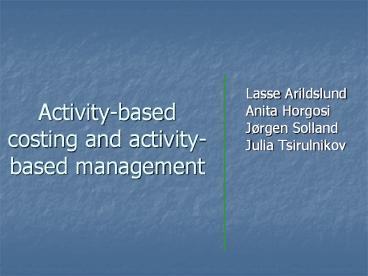Activity-based costing and activity-based management
Title:
Activity-based costing and activity-based management
Description:
Activity-based costing and activity-based management Lasse Arildslund Anita Horgosi J rgen Solland Julia Tsirulnikov What is Activity-based costing? –
Number of Views:632
Avg rating:3.0/5.0
Title: Activity-based costing and activity-based management
1
Activity-based costing and activity-based
management
- Lasse Arildslund
- Anita Horgosi
- Jørgen Solland
- Julia Tsirulnikov
2
What is Activity-based costing?
- Activity-based costing is a costing approach
that assigns resource costs to a cost object
based on activities performed for the cost object - This method enables traditionally fixed costs to
be distributed among product groups, converting
them into variable costs - Also gives non-financial information in
opposition with conventional costing system
3
What is the objective of Activity-based
management?
- Activity-based management is a method of
business analysis that utilizes ABC information - improving competitiveness, cost reduction,
increasing productivity and augmenting
flexibility in meeting customers needs - Focuses on changing the way the work is carried
out or on the reasons why the work is performed - Operational ABM doing things right and
performing activities more efficiently - Strategic ABM Choosing appropriate activities
for the operation
4
How would you describe strategic ABM?
- Strategic ABM Choosing appropriate activities
for the operation, doing the right things - Encompasses actions that shift the mix of
activities away from unprofitable applications
5
Under which circumstances would you recommend to
consider introducing strategic ABM?
- Highly recommended for service sector
organisations, and companies with complex
production processes and a wide portfolio - ABC is not a quick fix requires patience and
participation to see the results? cultures that
reward only short-term results are not fertile
grounds for ABC - Most common characteristics of successful
systems - High level of top management support and
commitment - Technical competence of the implementation team
- Effective change management
6
In which respect is the policy of "doing right
things" under strategic ABM different from the
same policy under such management systems as TQM,
BPR, etc.?
- Management system in the management system
- ABM is a more detail focused strategy, whereas
TQM and BPR are strategies on a macro level
7
What is a difference, if any, in decision
making between companies adopted and not adopted
strategic ABM?
- Using also non-financial information
- Time-consumption
- Division of accounting activities
- Ethical problems and sub-optimization
8
How is strategic ABM related to strategy
implementation?
- ABC can be used as a basis for strategic decision
making - E.g. regarding changes in the supply chain and
changes in target customers
9
How would you calculate the costs of
introducing ABM in a company and potential
benefits?
- Predictable costs Consultancy hours, ABC
software, Education - Unpredictable costs Use of employees in the
development process, Organizational changes - Benefits More efficent processes, Easier to make
rational decisions
10
Thank you for your attention!
11
Literature
- Baranov Management Accounting for Multinational
Companies (reader, 2007, p.28-52) - Blocher, Chen, Cokins, Lin Cost Management A
Strategic Emphasis (2005, p.120-135) - Coombs, Hobbs, Jenkins Management Accounting
Principles and Applications (2005, p.67-74) - Londerback, Holmen Managerial Accounting (10th
edition, 2003, p.133) - Maher, Stickney, Weil Managerial Accounting- an
introduction to concepts, methodsuses (9th
edition, 2006, p.89-90)































